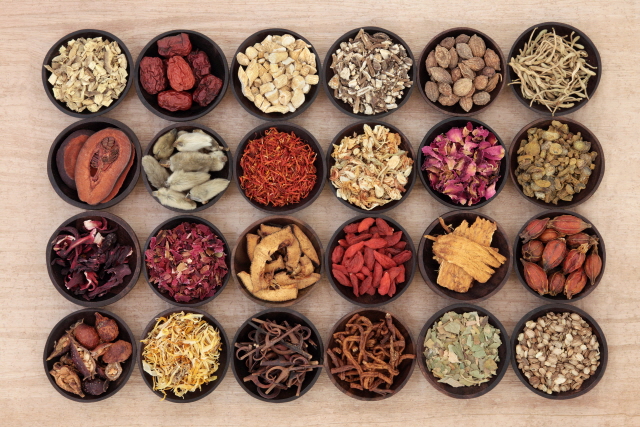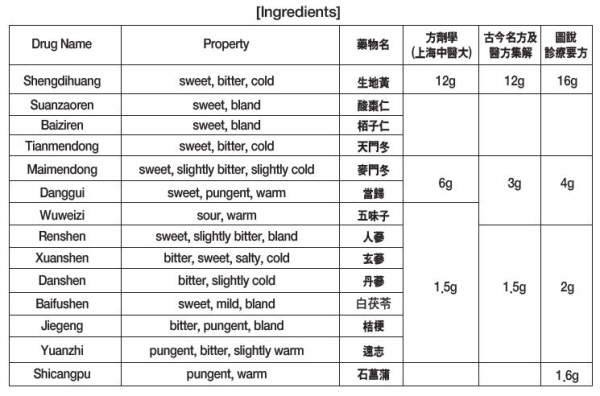
The formula should be distinguished from Wendan-Tang.
By Jubong Kang, KMD
Actions and Diagnosis
This prescription treats the syndrome of the heart and kidney’s yin-blood deficiency caused by excessive mental activity or stress. It includes palpitation, irritability, anxiety, insomnia, stomatitis, night sweats, forgetfulness, nocturnal emission, reddened tongue and little fur, etc.; some patients often complain that hot breath comes out of their throats.
Excessive use of the mind produces more heat than usual in the heart, which must be released sufficiently through breathing, so more moisture is needed in the lung. Suppose this condition persists for a long time, and the lung lacks moisture; the lung consumes the moisture in the blood, so the blood becomes thick and murky, and even Kidney-yin, the source of yin-blood, is reducing. It is the yin deficiency of the heart and kidney and becomes the syndrome of Tianwang-Buxin-Dan.
The prescription in Shanghan Lun that can accomplish the same effect as Tianwang-Buxin-Dan is Zigancao-Tang. Usually, doctors who favor post-Shanghan-Lun prescriptions use Tianwang-Buxin-Dan, but those who prefer “Shang Han Lun” formulas add or subtract necessary drugs to Zhigancao-Tang depending on the symptoms.
In terms of the composition and structure of the prescription, Tianwang-Buxin-Dan can be said to be a prescription made based on Zhigancao-Tang of “Shang Han Lun.”
This prescription consisted of 12 to 13 constituent drugs in the source text. It could be compressed into a prescription consisting of about six drugs: Shengdihuang 12~20g, Maimendong 6g, Suanzaoren 6g, Danggui 6g, Renshen 3g, Fuling 3g.
Among the constituent drugs of this prescription, Shengdihuang works as a monarch drug, drains heat, cools blood, and has a sweet flavor to produce fluid and replenish yin.
Maimendong is a minister drug that has the function of nourishing yin, moistening the lung, and clearing away the heat of the heart. Therefore, it improves irritability, adversely rising-qi, and dryness of the mouth and tongue caused by yin deficiency and asthenia-heat, and assists Shengdihuang. Suanzaoren nourishes the liver and heart to improve insomnia, palpitation, irritability, and sweating. In particular, it is effective for insomnia caused by yang-hyperactivity due to yin-deficiency when used with Shengdihuang or Xuanshen. Danggui nourishes blood, enhances blood circulation, and improves neurological and insomnia symptoms caused by blood deficiency. And the herb also prevents the occurrence of phlegm, dampness, and blood stasis.
Tianmendong, Baiziren, Renshen, Fuling, Danshen, Xuanshen, Jiegeng, and Yuanzhi play the role of adjuvant drugs. Tianmendong and Maimendong nourish yin, produce body fluid, and clear away asthenia fire. Baiziren assists Suanzaoren by tranquilizing the mind and helping sound sleep. Renshen benefits qi, produces body fluid, calms the spirit, and restores fatigue and lethargy. Fuling induces diuresis, sedating palpitation and excitement caused by phlegm retention. And this drains dampness and phlegm caused by drugs that nourish yin and blood. Danshen helps Danggui promote blood circulation, remove blood stasis, and regulate menstruation. Pharmacologically, Danshen has the effect of dilating blood vessels and lowering blood pressure. Xuanshen nourishes yin to the lung, stomach, and kidneys and cools the blood. Therefore, it stops prime minister-fire upsetting due to kidney yin deficiency, reduces emotional excitement, and treats symptoms of complaining of hot breath in the mouth. Like Danshen, pharmacologically, Xuanshen strengthens the heart, expands blood vessels, and lowers blood pressure.
Yuanzhi tranquilizes the spirit, strengthens the mind, and thus improves anxiety, palpitation, forgetfulness, and insomnia. Jiegeng disperses the lung to eliminate phlegm and dissipate the sore throat. Schicangpu releases phlegm, restores consciousness, and stabilizes the mind with its bitter and pungent flavor.
In diagnosis, patients with this prescription have neurological symptoms such as nervous breakdown, vexation, hypersensitivity, fear, heart palpitation, forgetfulness, insomnia, spontaneous sweating, night perspiration, nocturnal emission, etc. When an abdominal diagnosis is performed, a relatively clear palpitation is palpated at the epigastric region or around the umbilicus.
Application
It is used for anxiety, palpitation, insomnia, spontaneous perspiration, night sweating, forgetfulness, stomatitis, dry throat, symptoms of hot breath coming out of the mouth, nervous breakdown, nocturnal emission, etc. If there is a panic disorder, Huangqi should be added.
Distinction
Wendan-Tang: Neurological symptoms in Wendan-Tang patients and Buxin-Dan patients may look similar. But Buxin-Dan is used for symptoms caused by yin-deficiency, whereas Wendan-Tang is used for anxiety, insomnia, and panic due to phlegm. Therefore, in Wendan-Tang, the tongue is moist and white fur appears, whereas in Buxin-Dan, the tongue is reddened, and there is little fur.

































